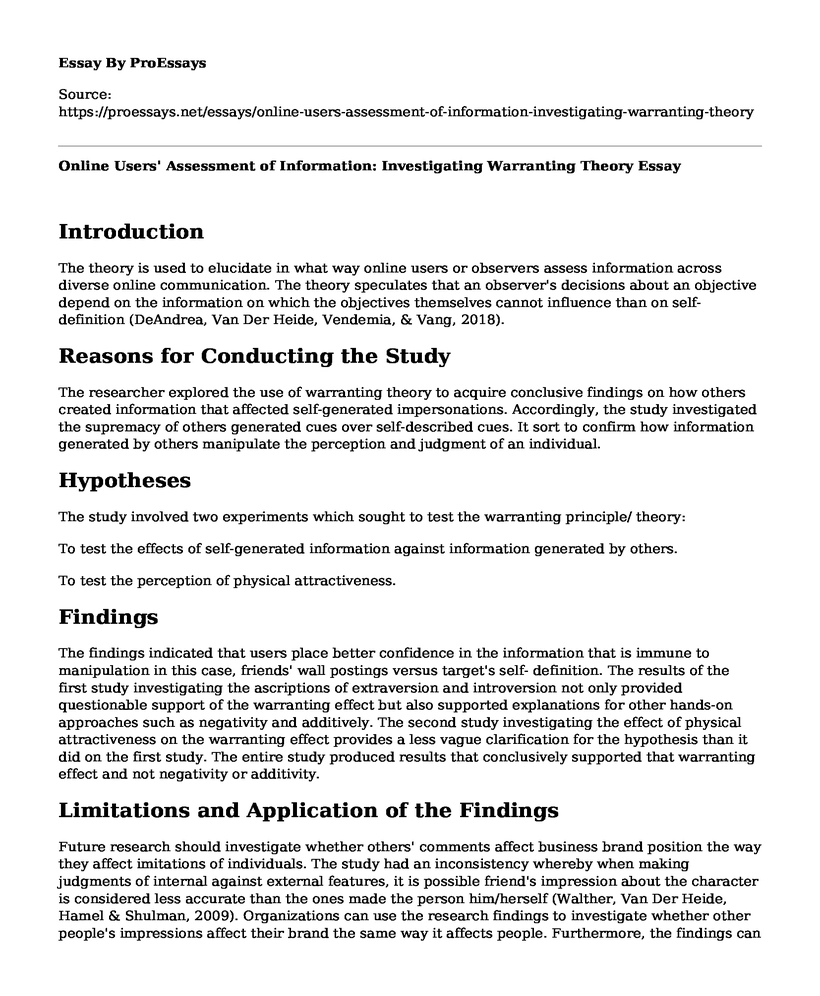Introduction
The theory is used to elucidate in what way online users or observers assess information across diverse online communication. The theory speculates that an observer's decisions about an objective depend on the information on which the objectives themselves cannot influence than on self- definition (DeAndrea, Van Der Heide, Vendemia, & Vang, 2018).
Reasons for Conducting the Study
The researcher explored the use of warranting theory to acquire conclusive findings on how others created information that affected self-generated impersonations. Accordingly, the study investigated the supremacy of others generated cues over self-described cues. It sort to confirm how information generated by others manipulate the perception and judgment of an individual.
Hypotheses
The study involved two experiments which sought to test the warranting principle/ theory:
To test the effects of self-generated information against information generated by others.
To test the perception of physical attractiveness.
Findings
The findings indicated that users place better confidence in the information that is immune to manipulation in this case, friends' wall postings versus target's self- definition. The results of the first study investigating the ascriptions of extraversion and introversion not only provided questionable support of the warranting effect but also supported explanations for other hands-on approaches such as negativity and additively. The second study investigating the effect of physical attractiveness on the warranting effect provides a less vague clarification for the hypothesis than it did on the first study. The entire study produced results that conclusively supported that warranting effect and not negativity or additivity.
Limitations and Application of the Findings
Future research should investigate whether others' comments affect business brand position the way they affect imitations of individuals. The study had an inconsistency whereby when making judgments of internal against external features, it is possible friend's impression about the character is considered less accurate than the ones made the person him/herself (Walther, Van Der Heide, Hamel & Shulman, 2009). Organizations can use the research findings to investigate whether other people's impressions affect their brand the same way it affects people. Furthermore, the findings can be used to further test warranting theory by other researchers.
References
DeAndrea, D. C., Van Der Heide, B., Vendemia, M. A., & Vang, M. H. (2018). How people evaluate online reviews. Communication Research, 45(5), 719-736. Retrieved from citeseerx.ist.psu.edu/viewdoc/download?doi=10.1.1.877.5342&rep=rep1&type=pdf.
Walther, J. B., Van Der Heide, B., Hamel, L. M., & Shulman, H. C. (2009). Self-generated versus other-generated statements and impressions in computer-mediated communication: A test of warranting theory using Facebook. Communication Research, 36(2), 229-253. Retrieved from www.academia.edu/download/1078860/warranting.pdf.
Cite this page
Online Users' Assessment of Information: Investigating Warranting Theory. (2023, Feb 27). Retrieved from https://proessays.net/essays/online-users-assessment-of-information-investigating-warranting-theory
If you are the original author of this essay and no longer wish to have it published on the ProEssays website, please click below to request its removal:
- Time Difference of Arrival and Ray Tracing Propagation Methods
- The Healthcare Staff Organization Strategic Plan Using SWOT Analysis
- Grupo Bimbo's Competitors and Strategic Recommendations - Essay Sample
- Essay Sample on Artnet, Criticism and the Eroding Critic Role in the Digital Age
- Essay Sample on Quantitative vs Qualitative Analysis: Exploring the Differences
- Paper Example on Walt Disney: From Small Animation Studio to Global Media Giant
- Strategic Analysis of a Jewelry Business in Singapore: SWOT, Location, and Management - Free Paper







